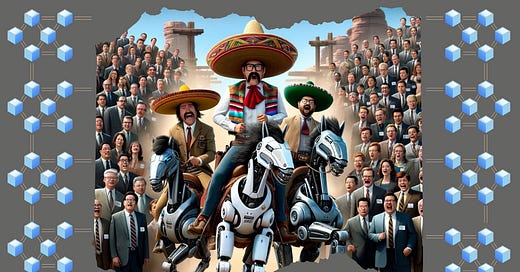DAO vs Merger: Merge the Accountants, not their Accounting Bodies
If we’re creating a monopoly, make it a decentralised monopoly!
A proposed merger of Australia's three major accounting bodies signals a move towards further centralisation, a trend viewed as outdated and futile by leading technologists in the digital economy.
As members of the accounting industry grow frustrated with their professional bodies and turn to online communities and emerging technologies like AI and blockchain, a more democratic and innovative approach is emerging: forming a Decentralised Autonomous Organisation (DAO).
A DAO is a significant departure from traditional unions and mergers. Rather than forming a dominant entity or amalgamating Australia’s three major professional accounting bodies into a single centralised entity, a DAO would merge the members of these bodies into a member-governed digital organisation.
This approach includes the existing professional bodies in a non-hierarchical DAO structure, without replacing or controlling them. A DAO's inclusive model could be more appealing to the professional bodies than a conventional merger, once blockchain as a governance technology is better understood..
Leveraging open blockchain technologies like smart contracts, and cryptographic currencies and tokens, a DAO offers an immutable voting system and and can also empower members to collaboratively scale their practices and monetise their expertise. Importantly, it avoids the concentration of power in a centralised authority like a "One Merged Accounting Body". Instead, a decentralised monopoly of members can vote and execute on collective decision-making.
Members of a DAO operate in a trustless, transparent manner, achieving consensus and interacting securely and autonomously, without the need for a centralised coordinating body. A DAO may also automate membership management, facilitate transparent voting on standards and policies, conduct peer reviews, manage continuous professional development (CPD) programs, and oversee ethical compliance reporting.
Accountants, who value reduced costs and increased profitability, are drawn to how DAOs can return more value to members than traditional bodies. In a DAO, members - whether token holders or developers/contributors - collectively decide on the organisation’s operations and finances through voting, eliminating the need for a centralised management structure and the associated agency costs.
Such direct control and ownership by all stakeholders could align member interests, leading to more efficient resource allocation, greater trust, and reduced conflicts of interest, ultimately fostering better governance and outcomes.
DAOs' flexibility to adapt and evolve based on member consensus ensures they remain relevant and responsive to the profession's changing needs. Accountants must look beyond the narrow professional education and future outlooks presented by their accounting bodies, acknowledging a rapidly evolving global economy where Bitcoin, blockchain, and AI converge for cheaper, faster, permissionless, and borderless business.
In future, many accountants may see a global standardisation of accounting standards, tax laws, and ethical codes to be in their best interests. Accounting practitioners and their bodies could self-represent on a global DAO-scale to support policies that level the playing field for smaller businesses participating in the decentralised digital economy in order to compete with large corporations.
Bitcoin, like a DAO, is democratic due to its decentralised nature - every participant can influence through the process of consensus on the network, ownership is widely distributed and there is no CEO or board.
Just as countries could agree on Bitcoin as a global currency standard while using local currencies, accountants worldwide could unite under an Accountants' DAO while remaining part of traditional bodies. A DAO could become the standard-setting domain for all professional accounting bodies.
Building an Accountants DAO on Bitcoin aligns the world’s finance professionals with progressive social and economic thinking, leveraging the security and universality of the world’s most decentralised network. Recent innovations have increased Bitcoin’s functionality, composability, and scalability, enabling the development of DAOs on top of its network (more on this in my next article).
The formation of a DAO also empowers smaller practitioners to compete with large firms for procurement and talent. By creating a network of niches, freelance professionals can form a decentralised monopoly that redistributes marketplace value equitably.
In conclusion, forming an Accountants’ DAO is a strategic move that starts with proposing a democratic, transparent, and efficient governance model of professional association.
As we adapt our business models to a Bitcoin-style future, a DAO is not just a viable alternative to merging our professional accounting bodies – it's a necessary evolution to keep the public accounting industry competitive, at the forefront of digital transformation.
Comments welcome!
Please share this with accountants you know, to seek their views.
If you like what I am doing and might want to join in, contact info@accountantsonchain.com and subscribe to this newsletter for updates. Please also follow Electra Frost on LinkedIn.
This post was written during the Bitcoin Writers Cohort.




